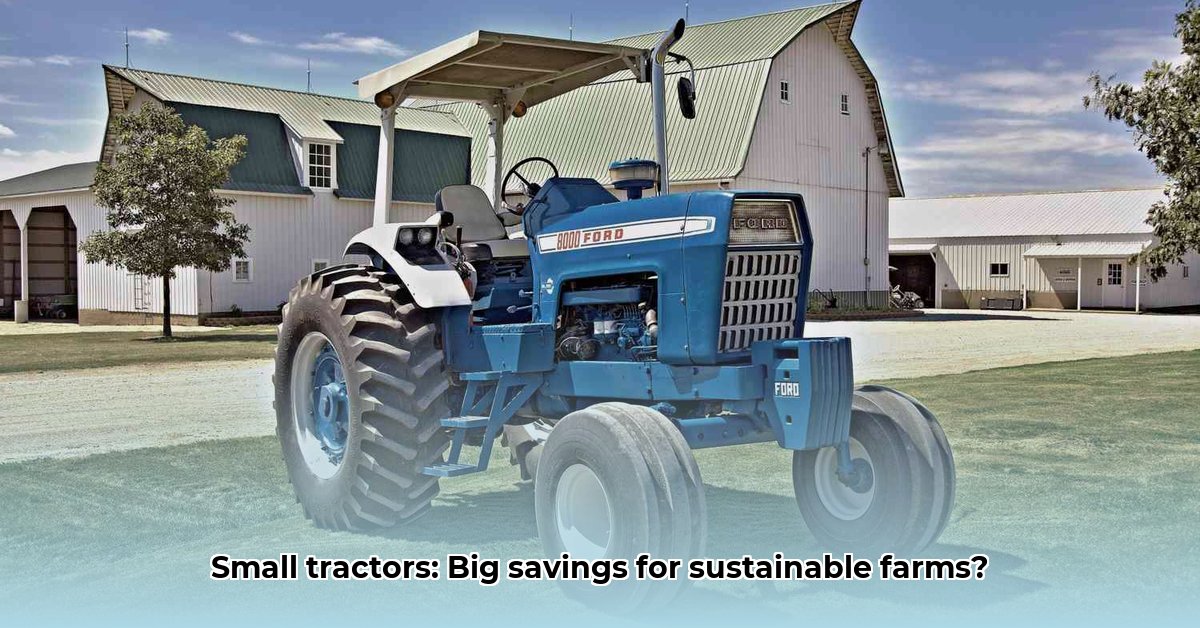
A Legacy of Affordability: Ford Tractors and Sustainable Agriculture
The rhythmic chug of a vintage Ford tractor, a soundtrack to generations of farmers, speaks to its enduring legacy. Henry Ford's vision—affordable machinery for the common farmer—revolutionized agriculture, empowering individuals to cultivate their land. Small Ford tractors, particularly those under 40 horsepower, became workhorses, their simple design and relative ease of maintenance making them accessible to a broader range of farmers. But in today's world, emphasizing sustainable practices and advanced technology, do these trusty machines still hold their own? This article explores the enduring relevance of small Ford tractors in modern sustainable agriculture, weighing their advantages against their limitations. For more on tractor financing, see our guide.
The Market for Used Ford Tractors: A Persistent Demand
Online marketplaces like TractorHouse and MachineryPete consistently reveal a robust demand for used Ford tractors under 40 HP. This persistent market signals their continued value, even in the era of technologically advanced, high-horsepower models. However, it's crucial to acknowledge the limitations of available data. These online platforms offer snapshots of market activity, not a complete picture of the global market for these tractors. Further research is needed to obtain a more comprehensive understanding.
Advantages in Sustainable Agriculture: Affordability and Accessibility
Small Ford tractors offer compelling advantages, particularly for farmers prioritizing sustainable and budget-conscious agricultural practices:
Affordability: The initial investment is considerably lower than that of newer models, making them accessible to small-scale farmers and those with limited budgets. This affordability can be a decisive factor in choosing sustainable practices. Isn't accessibility a cornerstone of truly sustainable agriculture?
Parts Availability: Despite their age, many parts remain readily available through various channels, including online marketplaces and local suppliers, though this availability can vary regionally. This readily available supply chain reduces reliance on new manufacturing and potential supply chain disruptions.
Reduced Environmental Impact (Potentially): Compared to larger, more modern tractors, these smaller models potentially consume less fuel and produce fewer emissions per acre worked during operation. Their simpler design also means a potentially lower carbon footprint during manufacturing. However, this depends on factors such as maintenance and operational practices.
Limitations and Challenges: Balancing Affordability with Efficiency
While the advantages are significant, it's crucial to acknowledge the inherent limitations of these older machines:
Lower Horsepower: The lower power output limits their use with larger implements or on extensive acreages. Tasks requiring significant power might be inefficient or even impossible. Does this limitation outweigh the affordability for your specific farm operation?
Fuel Efficiency: Older engines are generally less fuel-efficient than modern models, leading to increased fuel costs and a larger environmental impact from fuel usage. This inefficiency might offset some of the environmental benefits of lower manufacturing emissions.
Limited Technological Capabilities: Small Ford tractors lack the sophisticated features (GPS guidance, precision planting) found in modern equipment, limiting efficiency and precision in operations. This lack of advanced features necessitates a more labor-intensive approach.
Maintenance Needs: Regular and diligent maintenance is crucial to ensure reliable operation and extend their lifespan, which is a time and resource commitment that needs consideration. Ignoring this can lead to costly repairs and downtime.
Case Studies: Real-World Applications in Sustainable Farming
(Further research is needed to include specific case studies featuring small-scale farmers successfully using these tractors in various contexts. Their experiences and adaptations for sustainable practices, including potential alternative fuel use, would be invaluable additions.)
Environmental Impact: A Holistic Assessment Needed
A complete view requires a comprehensive lifecycle assessment (LCA). This LCA would account for manufacturing emissions, fuel consumption during use, regular maintenance, and eventual disposal. While the initial carbon footprint might be lower, the long-term impact of fuel consumption and maintenance needs careful consideration. This complex analysis warrants further research to clarify the true net environmental impact.
Actionable Recommendations for Stakeholders
Maximizing the benefits and mitigating the drawbacks requires a collaborative approach across stakeholders:
Small-Scale Farmers: Thoroughly inspect any prospective tractor; prioritize regular maintenance; explore fuel-efficient modifications or alternative fuels where feasible.
Parts Suppliers: Strategically stock commonly needed parts; prioritize sustainable sourcing practices; collaborate to ensure parts availability.
Researchers: Conduct comprehensive LCAs of various tractor types; investigate and develop technologies to enhance efficiency and sustainability of older models.
Policy Makers: Develop support programs providing small-scale farmers access to affordable resources and incentives for adopting sustainable farming practices, including grants for tractor maintenance and alternative fuel research.
Conclusion: Contextualizing the Decision
Small Ford tractors present a viable and affordable option for certain farming operations, particularly for small-scale farmers prioritizing budget-friendliness and readily available parts. However, careful consideration of their limitations relative to one's specific needs is paramount. Further research providing a comprehensive LCA and detailed case studies will be important in informing future decisions around sustainable agricultural practices. The optimal choice always depends on the context and specific circumstances of the farm.
Further Research and Resources
- TractorHouse
- MachineryPete (Additional resources will be added as research progresses.)